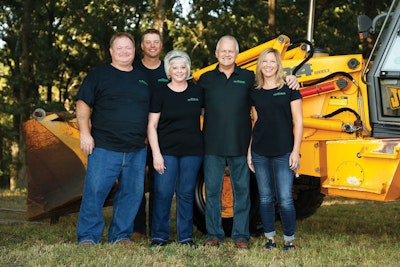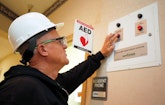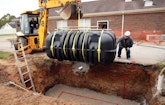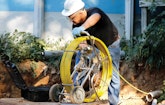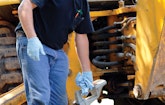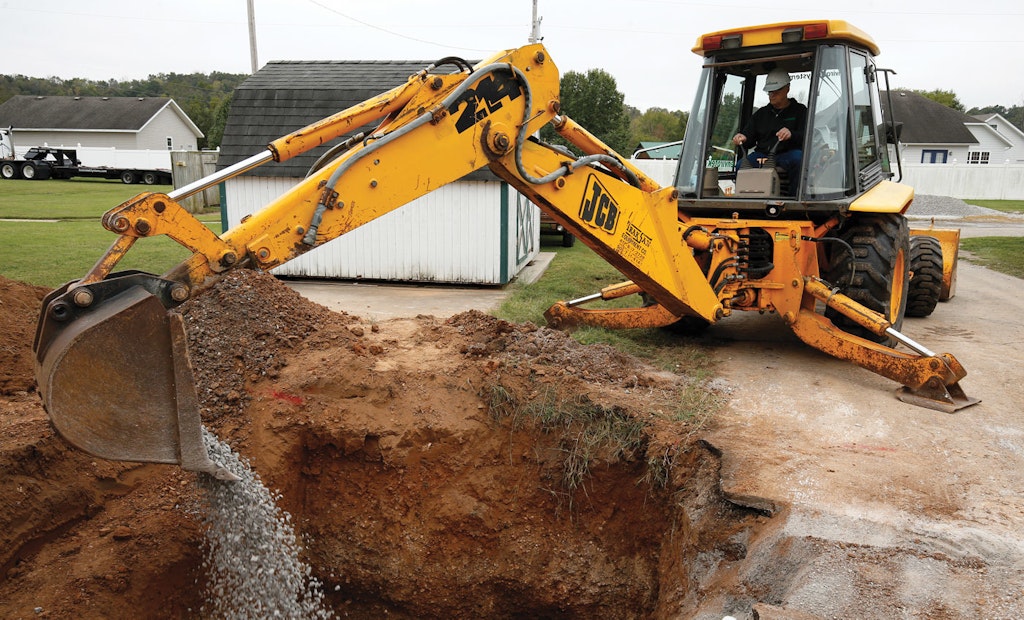From the time he moved to the Ozarks, Jon Hancock found the wastewater business a productive one.
“We liked this part of the country. There’s beautiful scenery here, lots of lakes. I love to fish, even though I stay too busy with work. I don’t make enough time for fishing,” Hancock says.
Since he came to the Ozark towns of Branson and Nixa in southwestern Missouri, he built Envirotek Systems into a company that thrives on challenges. Now he is expanding into a new enterprise that promises to keep him away from that fishing boat for a while longer.
BUILDING ON SERVICE
About 90 to 95 percent of Envirotek Systems’ business is repair and remediation work on wastewater systems. The rest is installations and inspections.
Hancock sees problems in both conventional systems and advanced treatment systems that he is called in to fix. He sees systems that are malfunctioning because of a combination of poor choices in design and installation as well as operation and maintenance. Poor choices probably stem from a lack of knowledge in installation and operation or determination to do a job well, he says.
“It could be someone not understanding or ignoring that a drainline needs to run downhill, not up and down. I see simple things like that overlooked during installations. I see lateral lines that run uphill instead of being level. How does that happen? I don’t know,” he says. “My working idea on that one is someone didn’t have experience with elevation equipment because grade stick measurements increase the higher you look on the stick. My idea is someone may have got the concept backward and thought he should read a lower number to get a falling elevation.”
He has seen a lack of compaction around pump stations or septic tank pipes settle and break. He sees electrical connections placed inside a pump chamber so they can be immersed by high water during a power failure. Or, a property changes hands, and the new owners are not familiar with the system and hire someone not familiar with the technology and how to maintain it.
Because of the number of lake lots he deals with, conventional septic tanks are not in the picture very often. For new systems, he will use something with advanced treatment such as the Bio-Microbics products. Troubled conventional systems in his area are commonly remediated with newer technology.
“We work in Arkansas a bit. I am licensed there, and I’m considering expanding farther than that. But right now, most of our work is in Missouri,” Hancock says.
The first company office was in Branson and still is, but after a time, Hancock opened a second office in Nixa, about 30 miles north of Branson and near the larger community of Springfield (population about 167,000). Hancock was receiving many job requests from that area, and it was also close to the suppliers he uses for his new venture: building pumps and control systems.
DOING IT HIMSELF
At least 50 percent of the service and repair work consists of building his own components.
“In 2017, we might have had a larger percentage because we did a big commercial project with our pump and controls systems,” Hancock says.
“I started building my own equipment because I wanted more reliability, functionality and flexibility in our systems. One of the big things was control over the pressure and flow of the system,” he says.
Some of the solutions he has come up with lie in his controls, some in his own designs for mechanical parts, and he doesn’t want to say more because there are patents pending on his ideas. His equipment finds a place in the treatment and distribution portion of wastewater systems he installs.
This part of his business has grown to the point where Hancock has rented space for a research and development shop. Perhaps there will be a need for machinery expansion in the future as the shop grows into other space and does more building, but at the moment, it is intended to build and test pump and control systems for projects.
“One thing we’re big on is trying to recreate, as much as we can, the exact conditions that we’re going to experience in the field,” he says.
He started development of his own components about eight years ago. Through his work, he befriended an electrical engineer who serves as a mentor and provides important design, programming and integration services for his systems.
“Of course there was a learning curve for me involved in being able to build our own systems, and it took a while for me to get up to speed on that,” Hancock says.
He likes hands-on learning but is being pulled away from it.
“I think that’s what a lot of small-business guys suffer from. They start out liking to do something, whether it be dirt work or plumbing, and then they often struggle with increasing the volume of their business or expanding because they’re too involved in everyday aspects and are on job sites. I’m still on every job site, and I’m hoping that I’ll be changing that in the near future as I grow my staff,” he says.
In other words, he is looking for someone else to work for him — not that this search is an easy task.
EQUIPMENT CORNER
Because Envirotek Systems has a specific niche, it maintains a small list of equipment. The company owns:
A JCB North America model 214 backhoe from 1995. With this is a hydraulic rock breaker and a compactor.
A 1996 compact track loader, model DL7000 made by ICC.
A 1980 F2275 International truck tractor.
A custom-built air-tilt and air suspension low-boy trailer (homemade). The air suspension was already installed when Hancock bought the trailer. Air tilts the bed, and because the suspension is air, there is no need to constantly replace springs or bushings.
A Wopson brand model WPS712DKC sewer camera.
An Amazing Machinery brand model AM400 sewer jetter.
A Radiodetection locator/receiver.
A 22-foot-long United Express Lines cargo trailer that houses all the pipe, fittings, camera, jetter and hand tools.
Three Wacker Neuson tampers, two of the small jumping models and a walk-behind vibrating plate model for road crossings.
A Northrock Industries concrete vibrator.
The concrete vibrator is useful for settling gravel used to bed poly tanks. Most poly tanks have ribs for strength, and when a tank is set, bedding material has to fill the void created by ribs under the tank, he says.
“So we were getting tired of pushing a short shovel in there to compact the small-diameter gravel we were using to fill in those voids, and I just happened to remember we had that concrete vibrator. And we can use it in tight quarters. You can take the point of that tool and shove it in cracks and crevices and get your compaction and also make your material flow to that area so it will fill up all the voids,” Hancock says.
He prefers poly tanks because he often works in tight quarters around lake homes where there is little room for big trucks and cranes. Because they’re so light, poly tanks are easy to maneuver into place. They can be set with the JCB North America backhoe. Connections are watertight, and there is no degradation of the tank by gases inside, he says. He likes to use Roth Global Plastics tanks.
HANDLING THE MACHINES
Hancock has deep experience in dirt work. He grew up on a farm around Kansas City, worked primarily by his older brothers. His brother-in-law, who did custom farming, taught him to handle a tractor and a stick shift automobile. If there was a mechanical breakdown, Hancock could drive the 5 miles to town at age 9 and fetch parts. At age 10, he started in his dad’s waterproofing business. His older brothers, David and Dennis, taught him to run heavy equipment while he was in high school and have been invaluable mentors throughout his career.
When he graduated from high school in 1975, he ran crews for his father for four years before starting his own business doing excavations for residential construction. Because it was a rural area, some clients began asking him to work on their septic systems. He had worked part time for a plumber while he was in high school, so he agreed.
In 1993, at the tail end of a boom, he moved to Branson where wastewater work was more plentiful and the country more pleasant.
“I got work from just returning a phone call,” Hancock says. “Some people don’t know this about the Ozarks, but the culture here is a bit different. It’s not uncommon for someone to set a job appointment for a Tuesday but leave early because hunting season is open. One key to my success is showing up on time.”
ONLINE REFERRALS ARE KEY
He still has the Branson office and will keep it. Administrative work is done there along with consulting with clients, but what’s more important is its recognizable name. Envirotek Systems also has a lot of contacts in that area, so it is not one to abandon. It is in the Nixa area where the growth is happening.
Hancock’s daughter, Chrissy, has a degree in marketing and helps her father with that. He recently hired an outside internet marketing company, First Page Access, to manage the company website. They specialize in search engine rankings, and since hiring them, he has noticed a significant increase in calls and business. There are some word-of-mouth referrals, but the website is bringing in much more business, especially younger people in the Nixa-Springfield area. Retirees and second homes are common around Branson.
“I still provide content and information, but I hired First Page Access because they make sure no other business in my industry uses my copyrighted material and they know how to make my website effective online. And online is how business gets done now,” Hancock says.
The website is split into two primary sections with content specific to each community. The Branson page talks about tank repair and installation with a section on the signs of a failing system. The Nixa pages include information about the company’s pump systems and inspection service. The content is constantly updated, and there is also a blog covering broad industry topics.
CHALLENGES ACCEPTED
“Interestingly enough, I’ve gotten some jobs in the Nixa area because a customer had a more challenging site and did an internet search around Branson. They assumed an installer from the Branson area might be faced with more challenging conditions because of the lakes,” Hancock says.
Typically these clients are professional people who tend to do a lot of research on the internet.
“Our clientele is becoming more and more information-minded. And I’ve noticed that some of the clientele are beginning to realize that they need to look for a special individual or a special firm that really does know their business. Clients don’t rely only on a license or certification,” he says.
Hancock is pushing Envirotek Systems’ expertise to make the company an obvious choice.
“I had a client make an interesting comment to me recently. He’s an engineer — I think a civil engineer — and he said, ‘I’ve had numerous people come out to look at this, and I’ve not yet found anybody who has instilled any confidence in me.’ That guy was ready to sign up with me before I even showed up,” Hancock recalls.
“I don’t know where we’re headed in our culture, but it seems that a lot of the younger generation once were of a mindset that they needed to get a degree in something and not necessarily learn a trade. I actually see the service industry evolving. I think it’s getting to the point where for guys like myself, their trade will be valued more than it once was, and people will be paying rates to services like mine that they pay to doctors and lawyers. That may be stretching it a bit,” he says.
For now, fishing will have to wait. Expansion of his business may give Hancock less time in a boat, but for the moment, he’s having too much fun to worry about it.
Attracting workers
As his business expands, Jon Hancock needs help at Envirotek Systems. He still works in the field on every job, but he feels a strong pull from the office and a pump and controls research and development shop. What he really needs is additional staff.
“I’m not too big on mediocrity. I would prefer to excel at something, and that’s the type of individual I’m looking for,” Hancock says. He wants an operator, laborer and technician for installation and service work, but such people are hard to find. Hancock says there is a shortage of qualified people based on the poor work he sees on wastewater systems he’s called in to fix.
“Typically you find a person with one skill set and train them in others because guys who know dirt work and plumbing and electrical — they don’t just fall off trees,” Hancock says. “I’ve noticed what may be a lack of passion in people in this line of work. They’re not passionate about learning.”
The exception is his dedicated staff and his wife, Cheryl, who are instrumental in the success of the business.
For the right person, there may be even more opportunity because at some point, Hancock will want to retire and pursue the fishing that he loves to do on the many lakes dotting the Ozark country where he lives. That right person may wind up getting the whole business.
